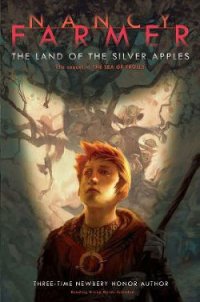Tehanu The Last Book of Earthsea - Le Guin Ursula Kroeber (серии книг читать онлайн бесплатно полностью .TXT) 📗
“I think they’re hunting for a new archmage after all,” said Tenar.
“Or looking for abuses of the art,” Ged said-’ "sorcery gone wrong."
Tenar was going to say, “Then they should look in the manor house of Re Albi!” but her tongue stumbled on the words. What was I going to say? she thought. Did I ever tell Ged about- I’m getting forgetful. What was it I was going to tell Ged? Oh, that we’d better mend the lower pasture gate before the cows get out.
There was always something, a dozen things, in the front of her mind, business of the farm. “Never one thing, for you,” Ogion had said. Even with Ged to help her, all her thoughts and days went into the business of the farm. He shared the housework with her as Flint had not; but Flint had been a farmer, and Ged was not. He learned fast, but there was a lot to learn. They worked. There was little time for talk, now. At the day’s end there was supper together, and bed together, and sleep, and wake at dawn and back to work, and so round and so round, like the wheel of a water mill, rising full and emptying, the days like the bright water falling.
“Hello, mother,” said the thin fellow at the farmyard gate. She thought it was Lark’s eldest and said, “What brings you by, lad?” Then she looked back at him across the clucking chickens and the parading geese.
“Spark!” she cried, and scattered the poultry, running to him.
“Well, well,” he said. “Don’t carry on."
He let her embrace him and stroke his face. He came in and sat down in the kitchen, at the table.
“Have you eaten? Did you see Apple?”
“I could eat.”
She rummaged in the well-stocked larder. “What ship are you on? Still the Gull?”
“No.” A pause. “My ship’s broke up."
She turned in horror-”Wrecked?”
“No.” He smiled without humor. “Crew’s broke up. King’s men took her over.”
“But-it wasn’t a pirate ship-”
“No.”
“Then why-?”
“Said the captain was running some goods they wanted,” he said, unwillingly. He was as thin as ever, but looked older, tanned dark, lank-haired, with a long, narrow face like Flint’s but still narrower, harder.
“Where’s dad?” he said.
Tenar stood still.
“You didn’t stop by your sister’s.”
“No,” he said, indifferent.
“Flint died three years ago,” she said. “Of a stroke. In the fields-on the path up from the lambing pens. Clear-brook found him. It was three years ago.
There was a silence. He did not know what to say, or had nothing to say.
She put food before him. He began to eat so hungrily that she set out more at once.
“When did you eat last?”
He shrugged, and ate.
She sat down across the table from him. Late-spring sunshine poured in the low window across the table and shone on the brass fender in the hearth.
He pushed the plate away at last.
“So who’s been running the farm?” he asked.
“What’s that to you, son?” she asked him, gently but drily.
“It’s mine,” he said, in a rather similar tone.
After a minute Tenar got up and cleared his dishes away. “So it is.”
“You can stay, o’ course,” he said, very awkwardly, perhaps attempting to joke; but he was not a joking man. “Old Clearbrook still around?”
“They’re all still here. And a man called Hawk, and a child I keep. Here. In the house. You’ll have to sleep in the loft-room. I’ll put the ladder up.” She faced him again. “Are you here for a stay, then?”
“I might be.”
So Flint had answered her questions for twenty years, denying her right to ask them by never answering yes or no, maintaining a freedom based on her ignorance; a poor, narrow sort of freedom, she thought.
“Poor lad,” she said, “your crew broken up, and your father dead, and strangers in your house, all in a day. You’ll want some time to get used to it all. I’m sorry, my son. But I’m glad you’re here. I thought of you often, on the seas, in the storms, in winter.”
He said nothing. He had nothing to offer, and was unable to accept. He pushed back his chair and was about to get up when Therru came in. He stared, half-risen, "What happened to her?” he said.
“She was burned. Here’s my son I told you about, Therru, the sailor, Spark. Therru’s your sister, Spark.”
“Sister!”
“By adoption.”
“Sister!” he said again, and looked around the kitchen as if for witness, and stared at his mother.
She stared back.
He went out, going wide of Therru, who stood motionless. He slammed the door behind him.
Tenar started to speak to Therru and could not.
“Don’t cry,” said the child who did not cry, coming to her, touching her arm. “Did he hurt you?”
“Oh Therru! Let me hold you!” She sat down at the table with Therru on her lap and in her arms, though the girl was getting big to be held, and had never learned how to do it easily. But Tenar held her and wept, and Therru bent her scarred face down against Tenar’s, till it was wet with tears.
Ged and Spark came in at dusk from opposite ends of the farm. Spark had evidently talked with Clearbrook and thought the situation over, and Ged was evidently trying to size it up. Very little was said at supper, and that cautiously. Spark made no complaint about not having his own room back, but ran up the ladder to the storage-loft like the sailor he was, and was apparently satisfied with the bed his mother had made him there, for he did not come back down till late in the morning.
He wanted breakfast then, and expected it to be served to him. His father had always been waited on by mother, wife, daughter. Was he less a man than his father? Was she to prove it to him? She served him his meal and cleared it away for him, and went back to the orchard where she and Therru and Shandy were burning off a plague of tent caterpillars that threatened to destroy the new-set fruit.
Spark went off to join Clearbrook and Tiff. And he stayed mostly with them, as the days passed. The heavy work requiring muscle and the skilled work with crops and sheep was done by Ged, Shandy, and Tenar, while the two old men who had been there all their lives, his father’s men, took him about and told him how they managed it all, and truly believed they were managing it all, and shared their belief with him.
Tenar became miserable in the house. Only outdoors, at the farmwork, did she have relief from the anger, the shame that Spark’s presence brought her.
“My turn,” she said to Ged, bitterly, in the starlit darkness of their room. “My turn to lose what I was proudest of.”
“What have you lost?”
“My son. The son I did not bring up to be a man. I failed. I failed him.” She bit her lip, gazing dry-eyed into the dark.
Ged did not try to argue with her or persuade her out of her grief. He asked, “Do you think he’ll stay?”
“Yes. He’s afraid to try and go back to sea. He didn’t tell me the truth, or not all the truth, about his ship. He was second mate. I suppose he was involved in carrying stolen goods. Secondhand piracy. I don’t care. Gontish sailors are all half-pirate. But he lies about it. He lies. He is jealous of you. A dishonest, envious man.”
“Frightened, I think,” Ged said. “Not wicked. And it is his farm.”
“Then he can have it! And may it be as generous to him as-”
“No, dear love,” Ged said, catching her with both voice and hands-”don’t speak-don’t say the evil word!” He was so urgent, so passionately earnest, that her anger turned right about into the love that was its source, and she cried, “I wouldn’t curse him, or this place! I didn’t mean it! Only it makes me so sorry, so ashamed! I am so sorry, Ged!”
“No, no, no. My dear, I don’t care what the boy thinks of me. But he’s very hard on you."
“And Therru. He treats her like- He said, he said to me, ‘What did she do, to look like that?’ What did she do-!”
Ged stroked her hair, as he often did, with a light, slow, repeated caress that would make them both sleepy with loving pleasure.




